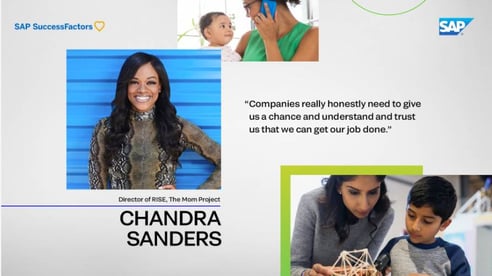In August and September of this year alone, one million people left the workforce -- 75% of those being women. Overall, more than 1.8 million women have left the workforce due to the pandemic, which is why The Mom Project launched RISE, a program whose mission is to create economic opportunities for moms and women of color. RISE is a scholarship program and provider of holistic support that accelerates equity by providing access to upskilling and reskilling opportunities. The goal is to ensure women are successful as they reenter the workforce and progress through their careers.
A recent study in July found that in considering a new job, flexibility is one of the most important factors. 89% of moms reported having the ability to work flexible hours throughout the day is important and 76% reported having the ability to work fully remote is important. Ask any mom who has been asking for flexibility for decades as the bulk of childcare and caregiving falls squarely on our shoulders, and it will come as no surprise. The pandemic simply highlighted the impossibility of balancing work and home to millions who had not experienced it before.
Together, we are always looking for ways to elevate the conversation around moms and women in the workforce. I was thrilled to be invited to sit down with NYT best-selling author and Emmy nominated storyteller, Baratunde Thurston, Global Head of Marketing from SAP SuccessFactors, April Crichlow, and author and speaker on advancing women of color, Minda Harts, on an Instagram live session titled, Face Forward: The Next Normal to talk about what we see in the market, and what I thought it would take to begin to reverse this disturbing trend.
We spoke at length about the impacts of the pandemic on women in the workforce, how to reverse the trend for all workers, and the structural change needed to create better human experience at work.
How is RISE helping women return to the workforce POST-PANDEMIC?
Economic opportunity, while important, is being dwarfed by the need for flexibility in the workplace by the millions that have been displaced – be it working remote, having flexible hours, or being offered benefits that match what workers today are looking for --- to get back to work. At RISE, we aim to create pathways and cultivate pipelines for moms and women of color that address both salary and the need for flexibility. The integration of both offers balance. There shouldn’t be a sacrifice of one over the other.
Reskilling, scholarship opportunities, professional development training, and free job placement assistance is imperative as women aren't necessarily coming back to the roles they left pre-pandemic. The need to acquire new skills sets, gain education, career counseling, and interview prep is crucial to finding new roles, especially in the field of technology.
Being able to ask for what’s needed to be successful is also important. Often, this comes down to flexibility. “Flexibility isn’t just a perk anymore,” Harts said during our session. “It shouldn’t be about an organization accommodating workers anymore, it shouldn’t be a sacrifice.” She went on to say that what’s good for women and underrepresented groups is ultimately and good for business. I couldn’t agree more.
How can organizations improve flexibility for workers?
The question then becomes how can companies put the needs of its workers into action? For one, supporting women who have been disproportionately impacted during the pandemic (however that looks) should be normalized. We must normalize making it work for everyone. Employers need to ask questions and build relationships that create transparency. One way to do this is by offering talent development opportunities when women start with an organization, then ensure they feel a sense of belonging while they are there. When that happens, everyone can contribute to the company’s success.
The days of treating people like commodities are over, Crichlow said. Worker’s needs, especially moms and women of color, have shifted during the pandemic. Leadership got a window into their employee’s lives during the past 18 months – working, cooking, parenting, teaching, and caregiving – and it’s time to make accommodations to help them be successful.
While the pandemic negatively impacted women and caregivers the most, it also significantly affected people on the margins. During the session, we discussed a study that reported 54% of Black employees said the first time they felt like they really belonged at their organization wasn’t until they started working from home. People of color deal with many microaggressions in an office setting, and finally having that psychological safety to ask for what they need while at home made a huge difference. Having that dialogue is key, and the ability to advocate for oneself and set boundaries happened when working from home. It is incumbent on leadership to listen.
Flexibility comes in many forms
Flexibility for all workers, however, isn’t just about working from home. Most workers are deskless and have to be in the field, so flexing where one works is difficult. At The Mom Project, we've found companies that are most successful at attracting and retaining talent get creative depending on the needs of their workers. Daily stipends, for instance, have worked for some to be able to take care of family (to be used on babysitting or daycare) while they go to work.
As a leader in this space, we’re also here to consult organizations on what they can be doing better. One topic we’ve continued to talk about is the role of empathetic leaders and going into conversations understanding their teams may all need something different. This means offering compassion on what their workforce is going through, what they’ve been through, and helping them so they can be productive and happy. Creating economic opportunities, especially for moms and women of color, is critical to make a dent in the devastation experienced over the past couple of years.
This means companies, like SAP and those partnering with The Mom Project, must lead by example. These may not be roles this population has held in the past, but women are pivoting. Employers need to do the same if they want to be a company of choice for top talent.
Watch the full interview with Baratunde Thurston on the importance of upskilling and supporting moms to re-enter the workforce after the “she-cession” of 2020 and 2021.
We look forward to sharing more with you soon. In the meantime, sign up for your account and start hiring moms today:




